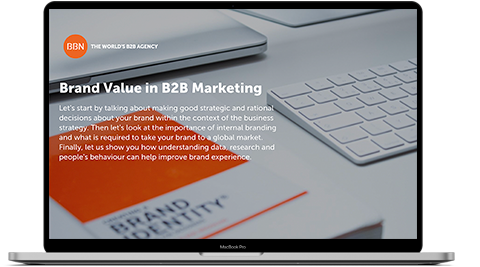On our blog in 2016, we discussed the vital role of a strong brand in B2B markets, and seven years later, the topic remains even more significant. With the increasingly competitive digital landscape, it’s essential to understand the growing importance of robust brand building in the B2B sector. Here are five key ways a powerful brand presence contributes to B2B success, backed by research and studies.
1. Facilitates Decision-Making Processes
Strong branding significantly streamlines decision-making processes for potential clients. A concept closely tied to this is ‘brand equity’. Brand equity is the added value a brand provides to a product or service beyond the functional benefits. In the B2B context, this equity often manifests in the form of trust, reputation, and recognition that customers associate with the brand, influencing their purchase decisions.
According to a blog post from Renegade, brand equity holds great significance in B2B markets, acting as a differentiator and decision influencer. In the realm of numerous competitive options, clients often rely on the established equity of a brand to make their purchasing decisions, as it reduces perceived risks and assures them of quality and reliability
2. Adds Value and Commands Premium Pricing
The value of a robust brand isn’t merely communicative; it’s also quantifiable in the price premium your business can command. A brand isn’t just a logo or a slogan—it’s an assurance of quality, reliability, and exclusivity. This, in turn, allows companies to employ ‘premiumisation’ strategies, setting higher prices for their products or services based on the perceived added value provided by their brand.
A blog post from Vistaar points out that implementing premium pricing is a viable and effective strategy for growth in industrial manufacturing B2B businesses. It argues that premiumisation isn’t merely about raising prices but strategically capturing value through well-developed branding and superior product offerings. Thus, a powerful brand presence enables businesses to command premium pricing, capitalising on the positive perceptions associated with their brand and subsequently driving business growth
3. Boosts Customer Loyalty
Customer loyalty is the bedrock of long-term business success, and a strong brand plays a vital role in establishing and nurturing it. The cumulative effect of consistent brand messaging and positive customer experiences leads to strong brand trust. Once established, this trust can translate into sustained customer loyalty, even in the face of competitive offerings.
According to a McKinsey report on the future of B2B sales, the importance of brand trust cannot be overstated. The report underscores customers nowadays expect more and companies need to shift to put them at the center of sales—by improving channels, technology, talent, incentives, and culture. This loyalty, fostered by strong brands, is pivotal for companies seeking to thrive in the rapidly evolving and highly competitive B2B landscape.
See Also: Why brand building matters to performance marketing
4. Differentiates from Competitors and Transforms Market Perceptions
In the saturated markets of 2023, differentiation has become critical. A strong brand helps your business stand out from competitors, giving you a competitive advantage.
A strong brand doesn’t just resonate with customers; it also alters the market’s overall perception of a company. It allows a company to position itself effectively within its industry, thereby influencing how competitors, partners, and stakeholders see it.
An article from Branding Strategy Insider talks about how strong brands can drive B2B markets. The strength of a brand can positively influence market perceptions, ultimately dictating the company’s positioning and the way the broader market views it. The article asserts that powerful branding can open doors to new business opportunities, create competitive advantages, and set the tone for industry leadership.
5. Facilitates Trust-building
Having a strong brand reputation can not only drive customer loyalty and premium pricing but also directly affect a company’s overall business performance and market share.
A comprehensive article from Forbes discussed the vital importance of brand trust, especially in the digital era. The article cites a study from Northwestern University, stating that brand trust measures how strongly customers believe a business can fulfil its promises. Furthermore, the article notes that a lack of trust can lead to drastic consequences, with nearly 40% of Americans choosing never to use a brand they no longer trust and another 40% looking for alternatives from competitors.
The article suggests that brands can foster trust by establishing authenticity and credibility, leveraging social proof and user-generated content, engaging in transparent communication, embracing influencer marketing, and using content marketing strategically. These elements contribute to building a robust and resilient brand that enhances overall business performance and helps secure market share.
References:
- “What is Brand Equity and Why Does It Matter for B2B,” Renegade LLC
- “Capturing Value and Driving Growth: Implementing Premiumization-based Pricing in Industrial Manufacturing B2B Businesses,” Vistaar
- “Future of B2B sales: The big reframe”, McKinsey
- “Why Strong Brands Drive B2B Markets”, Branding Strategy Advisor
- “Building Brand Trust In The Digital Era: Strategies For Establishing Credibility And Authenticity”, Forbes







